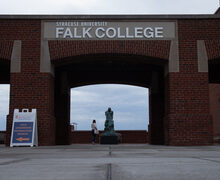SU law professors, students revisit cold cases from civil rights era in Five Cities Project
John Glenn | The Cold Case Justice Initiative
(From left) Diane Nash and John Steele march in Philadelphia, commemorating the 49th anniversary of the deaths of several civil rights leaders, whose names are written on the cross.
This summer, Syracuse University professors and students traveled down south to further investigate the truth.
The Five Cities Project, part of the Cold Case Justice Initiative, recently concluded its reinvestigation of at least 100 unsolved murder cases from the civil rights era.
The team consisted of College of Law professors and law students. The caseload was a mix of requests from families not satisfied with official reports, and new cases found through old news articles and documents.
The project focused on five cities in the South: Jacksonville, Fla., Nashville, Tenn., Jackson, Miss., Baton Rouge, La., and Atlanta, Ga.
The team spread out among these cities, finding at least 100 cold cases not included on any other law enforcement lists, said Janis McDonald, co-director of the initiative and a professor of law.
In these cases, decades-old grief and a lingering suspicion of a family member’s listed cause of death are common.
The families are happy to have their suspicions validated, and the killing acknowledged, McDonald said. Although the initiative does not have the power to prosecute, it promises families a thorough investigation.
“What struck me the most is that they simply want an acknowledgement from someone in a position of authority that their loved ones did not die in vain,” Mark O’Brien, a law student who worked on the project, said in an email.
Some want their family member’s death certificate corrected to state the cause of death as homicide, rather than an accident or suicide.
The reasons for unsatisfying results are complex, she said. During the civil rights era, the FBI failed to interview key witnesses, follow up with them or were deliberately misled by paid informants, McDonald said.
But during that time, agents also faced limitations, such as communities that mistrusted them and a director at the time who didn’t prioritize these cases, McDonald said.
The investigations aren’t without their frustrations. One of the most recent cases they looked into saw the suspect die before they could be convicted, McDonald said, because federal prosecutors moved too slowly. In other cases, family members of the victim have died, she said.
The investigations drew on multiple sources. Databases, courthouse papers, old FBI files. Warehouses full of old documents. News articles from the civil rights era — especially from African-American newspapers, which reported more information on the deaths during that time.
The students did most of the research, while McDonald and Paula Johnson, the other co-director of the initiative, met the families of the victims.
“When a report says ‘self-defense’ or ‘suicide,’ it gives us pause,” said Johnson, who’s also a professor of law. The team also consulted community organizations, which may know of incidents where some people dispute the official record, she said.
The students vet the deaths for details on the death certificate that don’t add up, then pass them on to Johnson and McDonald, who review them.
Some family members are “gung-ho” for an investigation, but others hesitate, not willing to “go down this road again,” Johnson said.
“We don’t make any demands on the family that they pursue an investigation,” she said.
Victims’ families are no longer just children and siblings, but grandchildren, too. The older generation of a family will sometimes keep the murder a secret from the younger generation.
This is sometimes out of concern for their well-being, or because it’s too difficult, Johnson said.
“Sometimes it’s simply too difficult to say that their mom or dad was shot and killed because they were black,” she said. The question all the families have to figure out, she said, is when it’s appropriate to do so.
But an important goal for the families is to acknowledge what really happened to their loved ones, said O’Brien, one of the students who worked on the project. He added investigating these cases is a big responsibility that no one takes lightly.
Said O’Brien: “In many ways, answers to what happened and why are more important to them than seeing someone convicted.”
Published on September 3, 2013 at 1:06 am
Contact Natsumi: [email protected]




